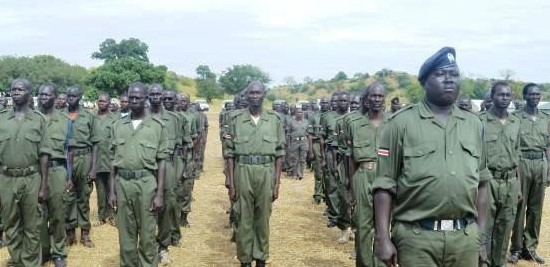Peace monitors worried over stalled security arrangements

Peace deal monitors in South Sudan are growing increasingly alarmed about the stalled implementation of the agreement, saying a lack of implementation of the security arrangements remains a “critical concern”.
According to reports, soldiers are abandoning cantonment and training sites across the country due to a lack of food and medicines.
Under the September 2018 peace deal, South Sudan is supposed to train and graduate 83,000 personnel to take charge of security during the ongoing transitional period.
The unity government formed in February 2020 has in the past cited financial constraints for the delay in the graduation of unified forces.
“Even though some progress has been made in some areas of implementation of the (Peace) Agreement, a critical concern remains on the security arrangements, which is fundamental to the peace process,” Charles Tai Gituai, interim chairman of the Reconstituted Joint Monitoring and Evaluation Commission (RJMEC), said on Thursday.
Gituai was speaking during the RJMEC monthly meeting in Juba.
The peace monitor appealed to the parties to the peace agreement to “urgently resolve the issue of the ratio of the unified forces and the unified command structure of the Necessary Unified Forces.”
The interim chairperson further urged the Revitalised Transitional Government of National Unity (RTGoNU) “in the spirit of addressing the insecurity in the country”, to expedite the unification of forces and the security arrangements, and establish the state security committees.
“I urge the RTGoNU to make financial resources available for the completion of the Transitional Security Arrangements, including graduation and redeployment of unified forces,” he added.
Emphasizing the importance of the Reconstituted Transitional National Legislative Assembly (TNLA) and the Council of States, Gituai told the meeting that the swearing-in of the members of these bodies should take place, while adhering to the 35% level of women representation and fair representation of the youth.
“This is important, particularly in the case of the TNLA because it should, upon commencement of its work, immediately ratify some important legislation that has been held up,” he said.
Gituai also appealed to the parties to the peace agreement for continued dialogue and trust- and confidence-building among them on all unresolved issues, “with a greater show of political will and commitment.”
“With the memories of celebrating ten years of independence fresh in our minds, we note that the months of August and September mark the halfway point of the Transitional Period and the three years since the signing of the R-ARCSS respectively,” Gituai said. “It is therefore imperative that the RTGoNU redoubles its efforts on the implementation of the remaining tasks that lay ahead of them.”